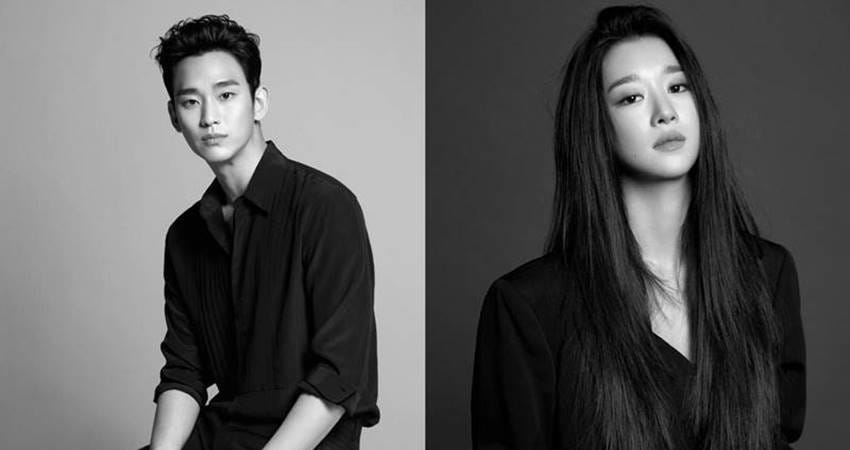"No Gain No Love"
This K-drama offers so much more than the marriage-contract trope. It's funny, heartbreaking and brutally honest.
손해 보기 싫어서
☆☆☆½
Son Hae-yeong (played by Shin Min-a)
Kim Ji-wook (played by Kim Young-dae)
↑Note: Korean names denote the surname followed by the given name.
My review of “No Gain No Love” is on the long side (what a surprise!). So for those who want a truncated synopsis to get an idea of whether they might want to watch this series (or not), here’s the tl;dr version from my annual list of top K-dramas for Teen Vogue:
Hae-yeong (Shin Min-a) doesn’t need to get married to appease her parents. But she does need a husband to prove to the higher ups at work that she’s responsible enough to be promoted. (Wrap your head around that for a second.) Knowing that she’s being penalized for being a single, successful woman, she hires the local convenience store part-timer, Ji-wook (Kim Young-dae), to pretend to be her spouse. That they will fall in love is a no brainer. But the joy of this series is watching how they get there. There’s a lot going on in these 12 episodes, with some of the best scenes centered on Hae-yeong’s best friends — one writes racy web novels, while the other is in an open relationship. The three women own their sexuality, as well as sex toys that make a surprising appearance during a home invasion. (Prime Video)
And now, my full review begins…
Starring Shin Min-a and Kim Young-dae, "No Gain No Love" falls into the contract marriage trope.
But, oh, it offers so much more.
Hae-yeong is an on-the-rise worker at an educational company that clearly favors married employees, especially when it comes to promotions. After her ex-boyfriend — who works with her —marries a well-connected colleague, Hae-yeong gets it into her head that she needs a husband, too. Though she is beautiful and very dateable, she doesn't want to deal with the issues of being with another man.
So she hires Ji-wook, who works at the neighborhood convenience store. Though he sports a goofy mullet, it's obvious to everyone how handsome he is.
But, of course, their meet cute isn't so much cute as it is contentious. Which we all know is K-drama speak for, "Of course they will end up together." That's not even a spoiler, because it's a given. All their bickering aside, Hae-yeong doesn't really care what people may think of her.
However, she doesn't want to ruin Ji-wook's future by marking him as a married man who divorced. (Part of their marriage contract details that they will separate after she has gotten her promotion. Because at work, it’s more acceptable for a woman to have had a failed marriage than to have never been wed.) Thus, Hae-yeong tells him to remain as anonymous as possible at their fake wedding to ensure that no one will remember him, or impact any future relationships he will have in real life.
Of course, people tend to remember exceptionally good-looking people.
She is surprised when Ji-wook knows more about her life than she had initially revealed to him. But what she doesn’t realize is that she and her friends are rather loose-lipped around anonymous people. They don’t really see him when he’s working at the convenience store, overhearing customers venting, lying and gushing. He remains quietly in the background observing.
This show addresses how unfairly women are treated in the workforce. At a job interview, one young woman is asked how she would react if her male boss paid her an inordinate amount of personal attention to her. She's in a no-win situation. If she complains, she will be considered too sensitive and someone who can’t fit into corporate culture. But if she makes light of the situation and gets hired, she could easily become a target for sexual harassment. Not only that, but the answer she gave during her interview — that she could diffuse the situation — could potentially be used against her.
So while it sounds ridiculous that Hae-yeong has a pretend marriage, it’s also ludicrous that she has to conjure up a husband so that she can be eligible for the perks given at work to couples — more vacation time, better pay, eligibility to enter work contests etc. This was also addressed in "Happiness," where an elite police officer fake-marries her best friend so that they’ll be eligible for an apartment rental. (To be clear, singles can rent in that complex. However, the discounted rate via her employer is available only to married couples.)
The concept of what makes a family is explored throughout this K-drama. For Ji-wook, their relationship isn’t so bad and gives him the opportunity to have a real family, especially after he ends up working at the same company as Hae-yeong. As with many K-dramas, there is a subplot involving abandonment and adoption. After his mother remarried, she left him behind in Korea with his grandmother while she started a new family in Canada that he wasn’t invited to join. (A similar plot is explored briefly in “Weightlifting Fairy Kim Bok-Joo.”)
One of the things that Hae-yeong picks up on is that Ji-wook doesn’t get upset or throw tantrums. He is always calm. It’s how he grew up. Children ideally grow up with a sense of security, knowing that they can occasionally lapse into bratty behavior and their parents will still love them. Ji-wook didn’t have that kind of luxury. He feared that if he raised a fuss about anything, he would be abandoned again.
The abandonment by his mother affects him greatly, especially after his grandmother dies. In episode 5 (maybe 6?), Ji-wook and Hae-yeong’s boss, Gyu-hyeon (Lee Sang-yi) are doing laundry at an orphanage. Ji-wook is a regular volunteer. Gyu-hyeon is a forced volunteer — part of his penance for leaving malicious comments on an author’s website. As the latter complains about having to hang laundry outside instead of throwing them into a dryer, Ji-wook points out that most children have the memory of their mother's scent. But orphans won't. The smell of laundry dried outside in the fresh air could be a core memory for them.
As each episode progresses, it’s clear that this pretend marriage has grown into a true relationship based on love, more than need. Ji-wook makes this clear in Episode 10, when he stops addressing Hae-yeong deferentially as 손님 (or guest, as he addressed everyone in the convenient store where he worked). Korean society dictates that specific words are used to address each other, depending on age and status. Dropping the honorifics shows that you're in a more close and intimate relationship. This is also depicted in “Reply 1988,” when Sun-woo (Go Kyung-pyo) dates his friend’s older sister Bo-ra (Ryu Hye-young) and tells her that he will no longer be using formal language with her.
K-dramas are often criticized for their ambiguous finales. The ending to this series is the kind of perfection that will leave most viewers feeling hopeful and pleased.
It should also be noted that this show isn't squeamish about depicting women who are knowledgeable about sex. Hae-yeong’s best friends are Ja-yeon (Han Ji-hyun) and Hee-sung (Joo Min-kyung). The former writes racy web novels, while the latter is a voice actress who’s in an open relationship with a producer.
Read more in the Spoiler Alert below.
Trivia: Shin Min-a and Lee Sang-yi had previously acted together in “Hometown Cha-Cha-Cha.” Kim Young-dae had co-starred opposite Han Ji-hyun in “The Penthouse” trilogy, where they portrayed siblings. (In Episode 7, he makes an oblique "Penthouse" reference when he moves into the penthouse — actually a small studio apartment — above Hae-yeong’s house.) And Byeon Woo-seok (“Lovely Runner”) makes a cameo as Ji-wook's replacement at the local convenience store.
Airdates: This 12-episode series (each about an hour long) aired on tvN from August 26 through October 1, 2024. (I watched this on Prime Video.)
Spoiler Alert: After Hae-yeong’s boss, Gyu-hyeon, discovers that Ji-wook is his illegitimate half brother, he demotes the couple. Ji-wook tells him that they are divorced, so there is no reason to punish Hae-yeong. He promises to resign.
Remember I had mentioned above that Gyu-hyeon had to work at the orphanage as part of his restitution for leaving defamatory remarks? It was about Ja-yeon’s writing, which he had caught his mother reading. As if a grown woman can’t write racy stories and an even more grown-er woman can’t read them? To make matters worse, it turns out that Ja-yeon’s crush is Gyu-hyeon’s assistant, Ha-jun (Lee Yoo-jin), and he’s the one who left the most inflammatory comment.
I wish that instead of capitulating to Gyu-hyeon’s demands, Ja-yeon would’ve revealed that the CEO was the one who had harassed her online. Or that Ji-wook would’ve told him, “If you fire us, I’ll tell the entire company that I am your brother.”
There’s a lot going on in the final two episodes. Episode 11, in particular, was difficult to watch because it deftly depicts what it is like to watch a parent's decline. When Hae-yeong’s mother was diagnosed with dementia, her doctor told her she would lose her memory quickly. Knowing this, the mom went to her childhood rural home to purge items. She didn’t want Hae-yeong to be burdened with having to sort through everything by herself.
In that same episode, Gyu-hyeon fights off Ja-yeon’s dad, who’s been released from prison. (He had killed Hae-yeong’s father.) Searching for weapons to defend himself, Gyu-hyeon grabs a container of mini light sabers that actually are sex toys that Hee-sung and Ja-yeon had given Hae-yeong for her 30th birthday.
By now, Gyu-hyeon has reconciled himself with having a sibling. He refers to his half brother in the familiar form as 지욱아 /Ji-wook-ah, which is his way of letting Ji-wook know that he has accepted him as family. The recognition reminded me a bit of "It's Okay to Not Be Okay," when Sang-tae (Oh Jung-Se) shows his acceptance of Moon-young (Seo Ye-ji) in his younger brother's life by giving her spending money, something older siblings do.
Personal reflections: This doesn't have to do with this show, but if you have children, consider getting a last will and testament (and possibly a trust, too) written up so that your family won’t have to deal with the distribution of finances during what will undoubtedly be an incredibly difficult time. While you’re at it, pre-pay for and/or leave your wishes for your future funeral. Pick out your casket or urn in advance. Write down what music you’d like played. If you want a Do Not Resuscitate (DNR) order in place, make sure you have all the documents signed…and let your family know your wishes.
Hae-yeong’s complicated relationship with her mother revolves around her feeling that her mom was always caring for foster children, leaving Hae-yeong feeling neglected. She wanted to be able to be selfish and have that kind of attention lavished on only her. Her mom remembered Ji-wook, who she took care of while Hae-yeong was in college. And though dementia took away most of her memory, including her daughter at times, she always remembered him.
I thought about my own family’s life back in Seoul, when my parents raised my paternal aunt's eldest daughter, whose father had died in the Korean War. My aunt worked and my young mother raised my cousin for years. My mother lavished attention on our cousin (who was a couple years older than my sister), because she felt she needed to give her the love that she couldn’t get from her own mother at that time. My sister was coddled by our grandparents, especially my grandfather who doted on her. She's also not the type to complain and beg for attention. But I know that my mother has regrets.
Episode 11 ends with a scene that had me in tears, because its depiction of getting that late-night call that your parent had died was all too real. During her last visit, Hae-yeong had told her mother she’d come back to see her again soon. I remember saying that to my father, too, not knowing that he would die shortly after my visit.
I will close this review by saying that there is something comforting about Korean funerals. Most modern-day funerals take place in the hospital where the patient dies. The grieving families are already accustomed to visiting their loved ones in the hospital. There is a dedicated area where mourners can pay their last respects to the deceased, before heading to an area where guests are served comfort food like yukgaejang (spicy beef soup), tteok (rice cakes) and banchan as thanks for coming to the funeral. (You can see more of this in Lee Hye-ri’s K-drama “May I Help You?”)
© 2025 JAE-HA KIM | All Rights Reserved







Thanks Jae-ha for unpacking this Kdrama so well re contemporary relationships and psychology and other things.
Still getting my head aroud the dildo defence scene
Not long ago watched it. A bit of a slow burn for me in first eps, but then on a roll. And as you said, last two eps were pretty good (in Oz parlance that means extremely good).
Thought Hae-yeong's foster sisters were pretty cool and strong characters.
Like other commenters, an admirer of Shin Min-a, a quite subtle but expressive actress.
Loved watching Home Town Cha Cha up until the sort of release about male lead's bad behaviour. His nice on screen persona in the drama and then negative media not resonant.
Did complete 6 months later, and glad I did.
And the issues of Abandonment and Adoption on the K scene but also on the Diaspora.
Have read a few of your Rolling Stone etc articles now. Impressed.
Shin Min A is really fantastic and the age difference was not as disturbing to me. Speaks to how much I was rooting for her. Really loved this drama too and I read they were considering a spin off with Gyu Hyeon and Ja Yeong? Is it true? You are so right that one of the best gifts a parent can give is a clear plan for their aging and passing.